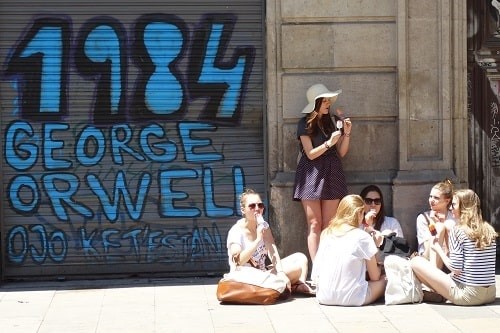There are obligations and responsibilities when operating as a charity that do not necessarily bear on every individual or organisation in the public eye.
Opinion
Truth and honesty as the base for safe working
In discussing Wagner’s operatic ring cycle – full of gods, giants and gold-working dwarves – about the lengths beings will go to achieve and exert control over others, a philosopher pointed out that when power alone arranges human dealings, then truth vanishes from the world.
The literature of totalitarianism focuses on this fact, whether it is Solzhenitsyn’s devastating descriptions of the Russian gulag, or Havel’s writings on eastern Europe before the Berlin Wall came down, the story is the same one of people being forced to live within the lie, to treat truth and falsehood as interchangeable. That is why in Orwell’s 1984 the Ministry of Truth was central to the government of his totalitarian dystopia.
 Plaza de George Orwell in Barcelona, Spain. Photograph: Wikimedia
Plaza de George Orwell in Barcelona, Spain. Photograph: Wikimedia
But while the Chinese government can try and whitewash the events 30 years ago in Tiananmen Square, in Beijing, and other government agencies offer ‘alternative facts’, the British Safety Council has to take great care in arguing from strong evidence.
A registered charity and, as importantly, a membership organisation, can only make statements, call for action, challenge poor policy and provide respected services in training, audits, consultancy and other areas if it ensures that it only speaks the truth. Our greatest asset, earned over decades, is our reputation for accuracy and honesty.
That is why, in the areas in which we are currently campaigning – on issues such as wellbeing and on urban air pollution and its impact on outdoor workers – you will have seen the starting point was research and checking and rechecking the data and its interpretation. The excellent literature review which identified what we know about workplace wellbeing programmes, Not just free fruit: wellbeing at work, published in December 2018 and the preparation undertaken with King’s College London before the launch of the Time to Breathe campaign are not exceptional, they represent our usual way of establishing strong, fact-based foundations to all our work, whether it is a campaign, the launch of a new training course or the updating of an audit programme.
One of the fundamental differences between the collective efforts we make to raise health and safety standards and the totalitarianism of left and right is this focus on the truth and the development of mutual trust, rather than perpetuating resentment.
One of the major companies that supports the broader work of the British safety Council and also has been one of the earliest participants in Mates in Mind, has recognised this to the extent that ‘Trust’ is going to be the central theme of their health and safety work within their business.
The sense of personal responsibility for other people’s safety, and their sense that this is accepted and will be honoured by taking care, is going to be highlighted to encourage team building and improved performance.
Instead of continually ramping up supervision and the use of checklists, workers in their teams will be reminded that their colleagues trust them to ‘do it right’ so that they too will be protected. It will be interesting to see the outcomes of these efforts, because if truth and honesty as the basis for safe working can trump fake news, that will be an honest good news story that we shall all wish to read.
OPINION

Is workplace health safe in 2026?
By Kevin Bampton, BOHS on 10 February 2026
UK Government efforts to boost the economy and employment levels through approaches such as deregulation pose a serious threat to the country’s workplace safety standards and the health of our workforce.

How stress and burnout will shape the workplace in 2026
By Charlotte Maxwell-Davies, Mental Health UK on 09 February 2026
Burnout is rapidly becoming one of the nation’s most significant workplace challenges. It is emerging as a defining issue for organisations and wider society, as the UK contends with a long-term sickness crisis driven by poor mental health. Stress can be motivating in short bursts, but when left unmanaged it contributes to work absences and lost productivity, as well as presenting a clear risk to the health of workers.

A new year, a new approach to risk?
By Mike Robinson FCA, British Safety Council on 02 February 2026
The rulebook is becoming obsolete faster than we can rewrite it. While bureaucracies labour to update yesterday’s regulations, the world of work transforms daily.



